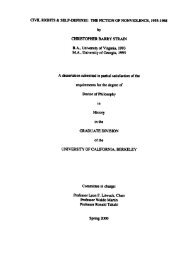Negro Digest - Freedom Archives
Negro Digest - Freedom Archives
Negro Digest - Freedom Archives
You also want an ePaper? Increase the reach of your titles
YUMPU automatically turns print PDFs into web optimized ePapers that Google loves.
NEW PROGRAMS<br />
AND EXPERIMENTATION<br />
The new courses proposed earlier<br />
do not complete the academic reforms<br />
which are needed. New curricula<br />
must prepare <strong>Negro</strong> students<br />
for occupations previously closed<br />
to them . Many predominantly <strong>Negro</strong><br />
colleges, starving financially,<br />
cannot afford the additional expense<br />
of new programs, no matter<br />
how desirable they may be .<br />
For example, if only five students<br />
seek training for college personnel<br />
positions, an impoverished<br />
institution may argue that it cannot<br />
afford to offer such a program .<br />
Instead, it will continue to prepare<br />
the fifty students interested in elementary<br />
and secondary school<br />
counseling . Thus, colleges, economically<br />
forced to perpetuate the<br />
traditional, fail to prepare <strong>Negro</strong><br />
students for new occupations .<br />
The Black University may suffer<br />
similar financial hardships ; vet it<br />
must offer new programs . Otherwise,<br />
it will betray its students and,<br />
in fact, may lose prospective students<br />
to larger universities which<br />
can afford such programs .<br />
The Black University also must<br />
discard the characteristic conservativism<br />
of most <strong>Negro</strong> institutions .<br />
Fearing criticism for failure, <strong>Negro</strong><br />
institutions rarely have gambled<br />
on educational experiments .<br />
Many of the so-called experiments<br />
in curriculum and method merely<br />
revive antiquated and abandoned<br />
practices . Or these "experiments"<br />
abandon academic standards under<br />
NEGRO DIGEST March 1968<br />
the pretext of respecting the socalled<br />
culture of the <strong>Negro</strong> .<br />
Experimentation must be encouraged<br />
. There should be experiments<br />
in methods of teaching, experiments<br />
with non-graded courses,<br />
experiments with tutorial sessions .<br />
But experiments must be conducted<br />
systematically . Control<br />
groups should be compared with<br />
the experimental groups, and student<br />
performance should be tested<br />
and evaluated . Always, the experiment<br />
should be designed to discover<br />
the most effective means of<br />
achieving desired results, never<br />
merely to confirm the validity of a<br />
pre-determined hypothesis . Possibly,<br />
experimentation will prove that<br />
many students cannot reach the required<br />
level of competence within<br />
four years . If so, the students must<br />
be retained longer . College education,<br />
thus, will not be envisioned<br />
as four years of courses producing<br />
a diploma as automatically as nine<br />
months of development produce a<br />
child . Instead, it should be viewed<br />
as the movement toward a goal, the<br />
duration determined by the knowledge,<br />
stamina, and quickness of the<br />
student .<br />
The need for new programs and<br />
experimentation is a problem for<br />
all of higher education, not merely<br />
for <strong>Negro</strong> institutions . I must reemphasize,<br />
however, that the term<br />
"experiment" or "curriculum development"<br />
should not mask a condescending<br />
acceptance of inadequate<br />
performance by <strong>Negro</strong>es . For<br />
example, some educators currently<br />
6 7
















